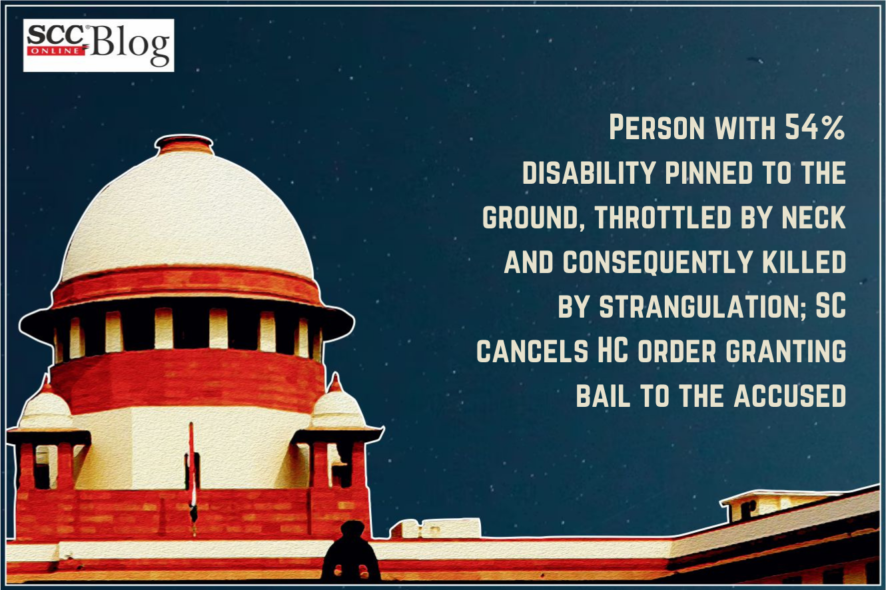Supreme Court: The Division Bench of M.R. Shah B.V. Nagarathna*, JJ., cancelled the bail order of the High Court against the person accused of killing a person with 54% disability by pinning him to the ground and throttling his neck. Finding the order of the High Court cryptic and casual, de hors coherent reasoning, the Bench invoked the latin maxim “cessante ratione legis cessat ipsa lex” to hold that “reason is the soul of the law, and when the reason of any particular law ceases, so does the law itself”.
Factual Matrix
The appellant, son of the deceased had assailed the impugned order of the High Court, whereby the respondent-accused was granted bail. The said order was impugned by the appellant on the following grounds:
- a) The allegation against the respondent-accused was under section 302 of the IPC with regard to the murder of the deceased Ram Swaroop Khokhar, the father of the informant-appellant who was a disabled person. Thus, the offence alleged against the respondent-accused was of a grave nature.
- b) The deceased had been elected in 2015 as the Deputy Sarpanch of Mandha Bhopawaspachar village despite opposition from the accused and his family. Therefore, owing to such political enmity, the accused overpowered the deceased who was suffering from 54% permanent physical impairment of both his legs, pinned him to the ground, sat on him and throttled his neck. As per the post-mortem report, the cause of death was ante-mortem strangulation.
- c) That the respondent-accused was a person exercising significant political influence due to which there was great difficulty in registering the FIR against him. Moreover, the accused was arrested only following a protest outside a police station demanding his arrest. Thus, the possibility of the accused threatening or otherwise influencing the witnesses, if on bail, could not be ruled out.
- d) That the respondent-accused had earlier preferred applications seeking bail, under section 437 of the CrPC on two occasions and again under section 439 of the CrPC but the same were rejected having regard to the gravity of the offences alleged against the accused.
The appellant alleged that the High Court in a very cryptic order, de hors any reasoning had granted bail to the respondent-accused which deserved to be set aside.
Reasoning given by the High Court
At the outset, the extracted portions were the only portions forming part of the “reasoning” of the High court while granting bail, which read as under:
“I have considered the submissions and perused the challan papers and the post-mortem report, but without expressing any opinion on the merits and demerits of the case, I deem it appropriate to enlarge the accused-petitioner on bail…”
Analysis and Conclusion
Though it is not necessary for a Court to give elaborate reasons while granting bail particularly when the case is at the initial stage and the allegations of the offences by the accused would not have been crystalised as such, however, the Court deciding a bail application cannot completely divorce its decision from material aspects of the case such as the allegations made against the accused; severity of the punishment if the allegations are proved beyond reasonable doubt and would result in a conviction; reasonable apprehension of the witnesses being influenced by the accused; tampering of the evidence; the frivolity in the case of the prosecution; criminal antecedents of the accused; and a prima facie satisfaction of the Court in support of the charge against the accused.
Ultimately, the Bench held that the Court considering an application for bail has to exercise discretion in a judicious manner and in accordance with the settled principles of law having regard to the crime alleged to be committed by the accused on the one hand and ensuring purity of the trial of the case on the other. As an order de hors reasoning or bereft of the relevant reasons cannot result in grant of bail. In such a case the prosecution or the informant has a right to assail the order before a higher forum.
Considering the factum of the case along with the established legal principles, the Bench concluded that the High Court had lost sight of the aforesaid material aspects of the case and had, by a very cryptic and casual order, de hors coherent reasoning, granted bail to the accused.
Accordingly, the appeal was allowed, the bail order of the respondent accused was declared cancelled and the respondent was directed to surrender before the concerned jail authorities within a period of two weeks.
[Manoj Kumar Khokhar v. State of Rajasthan, 2022 SCC OnLine SC 30, decided on 11-01-2022]
*Judgment by: Justice B.V. Nagarathna
Appearance by:
For the Appellant: Basant R., Senior Counsel
For the Respondent: Aditya Kumar Choudhary, Advocate
Kamini Sharma, Editorial Assistant has put this report together






